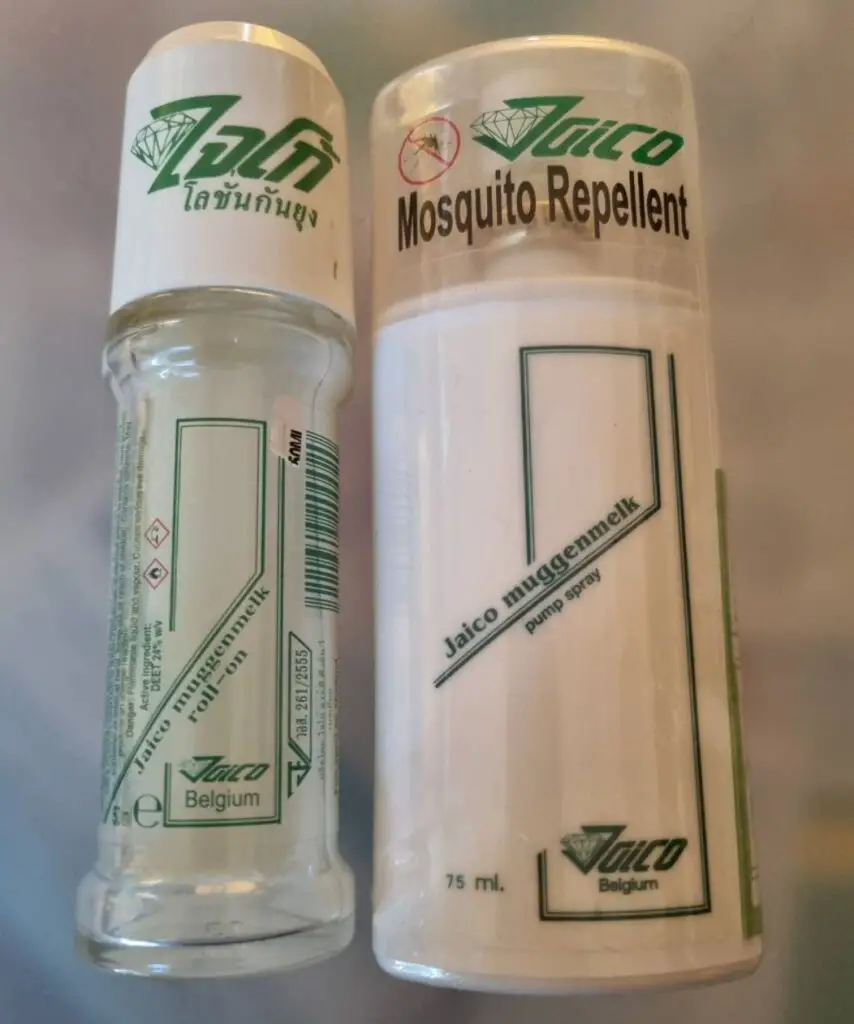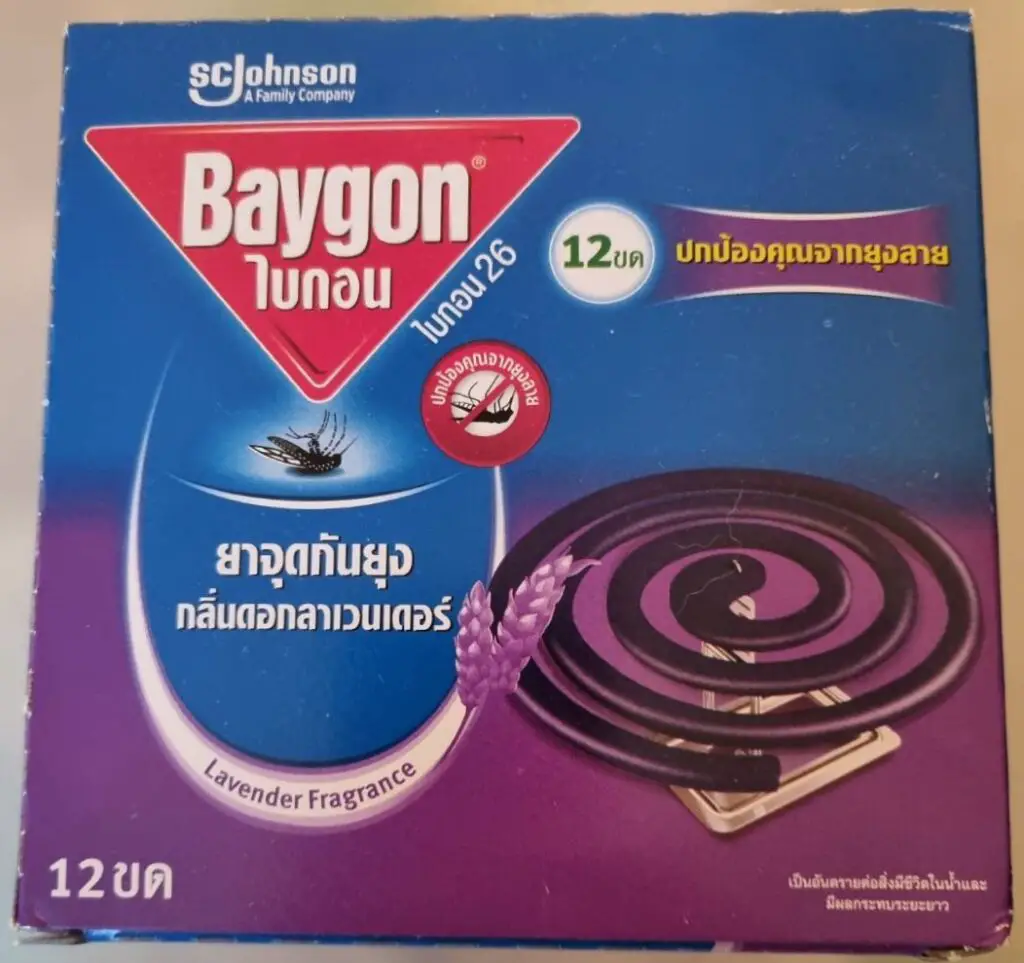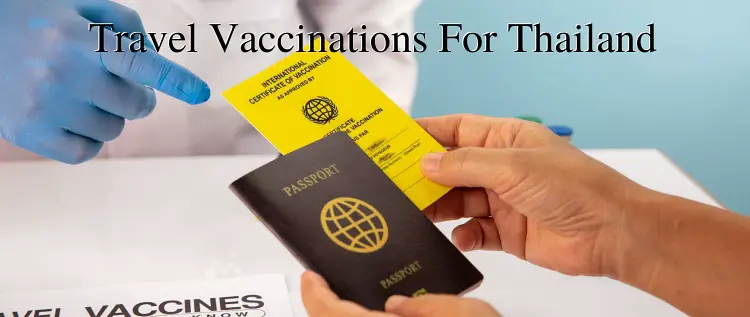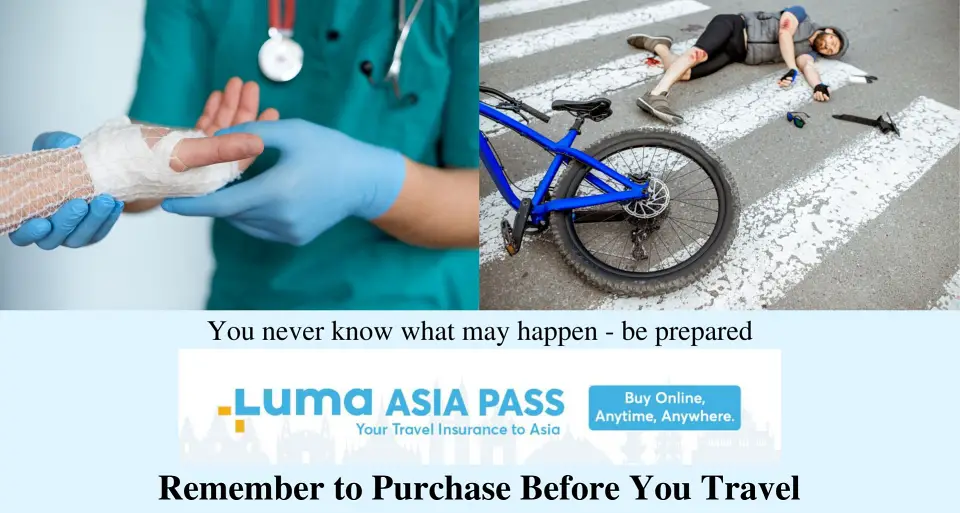Thailand is a wonderful country with many areas to explore from urban sprawl to dense jungle or mangrove swamp. One thing to consider before arriving here is what Travel Vaccinations for Thailand are recommended.
The CDC recommended vaccinations for Thailand:
- Routine Childhood vaccinations (Chicken Pox, Diphtheria-Tetanus-Pertussis, Flu, Measles, Mumps, Rubella, Polio and Shingles)
- Covid-19 – A good idea to have, but no longer required to enter the country.
- Hepatitis A and Hepatitis B – both are recommended
- Japanese Encephalitis – not required when planning short-term travel to urban areas, or areas without a Japanese Encephalitis season
- Malaria – in general not needed – only for specific areas, see map, (adjacent nations), not required for tourist/urban areas.
- Measles – normally covered in your childhood vaccinations
- Rabies – only if you get bitten by a rabid animal (dog) and the vaccine is commonly available in Thailand if required
- Typhoid – recommended for most, especially if visiting/staying in rural areas
I’m always excited about traveling, and I bet you are too. Thailand, with its rich culture, lush landscapes, and delectable cuisine, invites adventure. But I know how important it is to prepare health-wise for such a trip. The first step in my travel prep? Ensuring I’m up to date on vaccinations.
Mosquitos (Yung) – the Scourge of the Planet
You guessed it, mosquitos are here in Thailand and indeed in every country on Earth. Nobody likes them, but they are always around. Protect yourself as much as you can. I have been here for 26 years and am one of those people mosquitos seem to find irresistible. I had all of my shots before coming to Thailand because I was coming here to live and work. So it was the right thing to do. Many tourists do not bother with all of the vaccinations on the list from the CDC and Thailand does not check to see if you have all of your vaccinations when you arrive.
After 26 years and numerous bites from mosquitos, I have been exceedingly lucky. I have not contracted any of the illnesses below, that I am aware of, though I am vaccinated against Malaria and Japanese Encephalitis. My daughter has had Dengue fever and was hospitalized for several days before getting better.
Mosquitos can transmit the following diseases:
- Malaria – Not common in Thailand unless you travel to areas close to Thailand’s borders with its neighboring countries.
- Japanese Encephalitis is not common here but can be found mostly in northern rural areas.
- Dengue Fever – breakbone fever – unfortunately can be found in urban and rural areas it is endemic to Thailand. Protect yourself from mosquitos as much as you can, especially early mornings and evenings. Transmission is more common during the rainy season (standing water). Note: There is no vaccine for Dengue Fever.
- Zitka – Found in Thailand, but is not common. There is an increased risk of birth defects for infants born of people infected with Zitka when pregnant. Protect yourself. Note: There is no vaccine for Zitka.
Mosquito Prevention Tips
- Wear long sleeves and pants if possible. I know it is not easy, as you have come here for fun in the sun – who wants to wear a long-sleeved shirt or long pants? – If you are enjoying a beach/seaside vacation – there will not be many mosquitoes.
- Avoid early morning and early evenings (when mosquitos are most active).
- Have a good mosquito repellant that you trust. I like Jaico mosquito repellent (from Belgium) – available in Thailand. It works for me.
- Deet mosquito repellent is readily available here in 7-11, pharmacies, or grocery stores, or ask your server if at a restaurant.
- Stay in a breezy area, if possible, ask for a fan, or sit on the beach with a sea breeze.
- Request a mosquito coil or mosquito repellant when dining outdoors (many restaurants will have them – Gaan Yung – written Thai = กันยุง).
- Use a mosquito net when staying in a room without air conditioning.
- Mosquitoes do not like citronella, lavender, jasmine, and lemon grass scents.
- Note: 7-11 sells mosquito repellent and mosquito coils, so you do not need to bring your own – Thailand has many 7-11s.


Thailand Tourism and Travel
Now, you might wonder, what does a trip to Thailand have to do with vaccinations? The answer lies in the preventive power they hold. Travel opens the door to experiences that are out of the ordinary, and that includes exposure to unfamiliar health risks. Thailand is home to infections less common in other parts of the world, like Hepatitis A and Typhoid fever. These illnesses can put a serious damper on your plans, or worse, have long-term health consequences.
With the right vaccinations, you can shield yourself from these diseases. The Center for Disease Control and Prevention (CDC) recommends specific vaccinations for travelers bound for Thailand. These typically include shots for Hepatitis A, Typhoid, and sometimes for Japanese Encephalitis, as well as routine vaccinations such as influenza.
The importance of this preparation can’t be understated. Not only does it protect you, but it also lessens the chance of spreading infections to others. Your shots are your travel armor. With that out of the way, you can dive into the sights and tastes of Thailand without much worry about your health.
So now, let’s move forward. You understand the ‘what’ and the ‘why,’ but you’re probably curious about when you should get vaccinated and what you should expect in terms of costs. Let’s explore these practical next steps to ensure your trip to Thailand is memorable and worry-free.
Understanding the Why: The Importance of Vaccinations for Thailand
You might wonder why it’s necessary to get vaccinated before visiting Thailand. Well, it’s all about control and prevention. Infectious diseases that are not common in your home country can be prevalent in Thailand. Being immunized can significantly reduce your risk of contracting diseases such as Hepatitis A and Typhoid, which can be transmitted through contaminated food or water.
Vaccinations have a broader impact than just on your personal health; they contribute to public health. When you get vaccinated, you’re not only protecting yourself, but you’re also contributing to the larger community’s health. This concept, known as herd immunity, helps to contain the spread of infections, safeguarding vulnerable populations who can’t be vaccinated for medical reasons.
Adhering to vaccination recommendations is an act of responsibility. Not only are you ensuring your trip isn’t derailed by preventable illnesses, but you are also respecting the well-being of local communities. The choices you make about your health have ripple effects, reinforcing the need for travelers to prioritize vaccinations. Always keep in mind that your actions have the power to protect both travelers and the people who call your destination home.
Timely Protection: Scheduling Your Vaccinations Before Departure
If you’re planning a trip to Thailand, I cannot emphasize enough the importance of getting vaccinated well ahead of time. Each vaccine has a different lead time to take full effect, and some may require multiple doses spaced weeks apart.
For instance, the CDC recommends that you get the Hepatitis A vaccine at least two weeks before travel. However, for full protection, a follow-up booster is often necessary 6 to 12 months later. Typhoid vaccine should also be administered at least two weeks before traveling. If you’re considering a vaccine like Japanese Encephalitis, you’ll need to start the vaccine course a month in advance, as it requires two doses spaced 28 days apart.
If your departure date is creeping up and you’ve delayed organizing your vaccinations, don’t panic just yet. Some vaccines can still be effective if taken last minute, and clinics can sometimes accommodate a more rapid schedule.
I recommend setting reminder systems, whether that’s an app or calendar alerts, to manage your pre-travel vaccination timeline. Such tools can be a lifesaver when it comes to keeping your health preparations on track amidst the hustle of trip planning.
As you jot down your itinerary, factor in vaccination timing. Balancing the excitement for your Thai adventure with the pragmatic steps required for health protection ensures you start your trip on the right foot.
Budgeting for Health: Costs Involved with Travel Vaccinations for Thailand
When planning a trip to Thailand, your finances are a key component of your preparation. It’s vital to account for the health-related expenses you’ll encounter, and vaccinations certainly top that list.
Prices for travel vaccinations can widely vary depending on several factors. These include the type of vaccine, the provider’s pricing, and your geographic location.
Even the most essential vaccinations, such as Hepatitis A and Typhoid, could range from reasonably affordable to notably pricey. For instance, the Hepatitis A vaccine might cost anywhere from $50 to $100 per dose. Typhoid vaccinations come in both injectable and oral forms and typically range between $70 to $150.
I urge you to not let these numbers discourage you. Instead, view them as an investment in your health and travel experience. You’re buying peace of mind, knowing that you’re protected from certain health risks allowing you to focus on the adventures ahead.
Another important factor is whether or not your health insurance plan covers travel vaccinations. Some insurers offer partial or full coverage, which can significantly reduce out-of-pocket costs. It’s advisable to speak with your insurance provider beforehand to understand your coverage. If you’re uninsured or your plan doesn’t cover vaccinations, clinics may offer payment plan options to help manage costs.
For those watching their wallet, local health departments or university travel clinics might offer more affordable rates. Keep an eye out for community health events or vaccine fairs—they’re occasional opportunities for discounted services.
Lastly, some vaccines require multiple doses spaced weeks or months apart—so timing is financial planning, too. Missing the follow-up doses not only compromises your health protection but could also mean sinking money into an incomplete vaccination course. I recommend prioritizing your vaccination scheduling as much as you focus on securing airfares or hotel bookings.
Completing Your Pre-Travel Checklist: Locating Vaccination Services
Finalizing your travel plans to Thailand involves more than just booking flights and packing bags. Vaccinations are a crucial part of this process. I’ll help you understand where you can get the necessary jabs to ensure your trip is as safe as possible.
First off, your local healthcare provider is often the most accessible place for travel vaccinations. They already know your medical history, which streamlines the process. If they don’t offer travel vaccinations, they can refer you to a specialist.
Traveler’s clinics are specifically designed for this purpose. They specialize in travel medicine and provide comprehensive services, including vaccinations, travel health advice, and even post-travel care if you need it. They might be more expensive, but their expertise in the field is unparalleled.
Some pharmacies now offer travel vaccinations, making it convenient to get vaccinated while you run your errands. Check if your local pharmacy has this service and what vaccinations they offer.
If you’re a bit short on time before your departure, look for last-minute options. Some travel clinics offer expedited services for travelers on a tight schedule.
Don’t forget to check your previous immunization records before you go. You might already have some immunizations that are valid for your trip.
Remember, getting vaccinated is a responsible step not just for your health but for the health of others you’ll come into contact with on your adventures. Be sure to take this step seriously and plan accordingly.
Once you are here, be smart about avoiding mosquitoes as much as possible, stay close to a breeze, use repellent, cover up at night when it is cooler and the mosquitoes are more active.
Note: This article is a guide, it is not medical advice, I have been here a long time and I rarely use mosquito repellent. I have been bitten, but I am still here. I do keep my vaccines up to date.




My brother suggested I might like this blog He was totally right This post actually made my day You can not imagine simply how much time I had spent for this info Thanks
You are most welcome. I know how hard it is to find information sometimes. It is all out there, but sorting through it often takes time.